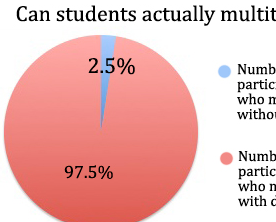As junior Kristen Luedtke drives home from work, she takes out her phone to call her mom. When she gets home, she turns on the TV and sits down with her computer. For the next couple hours Luedtke switches from Facebook to homework while flipping through TV channels.
This appears to be a common scenario among college students, who inevitably have an abundance of media and technology, and an unofficial TommieMedia poll proved that Luedtke isn’t alone. Eighty percent of respondents said they were able to multitask.
“I’m always multitasking,” junior Sam Zastrow said. “I think I would get bored if I wasn’t doing more than one thing at a time.”
However, a recent study found only 2.5 percent of people can multitask without a decrease in performance in either task.
The study, conducted by professors at the University of Utah psychology department, tested 200 students in a driving simulator. To imitate talking on a phone while driving, the students were asked to memorize simple series of words and solve simple math problems. Then, both tasks were tested individually.
Out of all the participants, 97.5 percent saw their driving performance drop 20 to 30 percent.
 The 2.5 percent of participants who were able to perform at the same level when conducting multiple tasks and single task were “supertaskers.”
The 2.5 percent of participants who were able to perform at the same level when conducting multiple tasks and single task were “supertaskers.”
“Some readers may also be wondering if they too are supertaskers,” authors David Strayer and Jason Watson said in the paper. “We suggest the odds of this are against them.”
This low percentage statistic comes at a time when several states are making laws to prevent distracted driving. In 21 states, including Minnesota, it is illegal to text while driving, according to the Governors Highway Safety Association. Six states prohibit the use of handheld phones while driving. No state has made all types of phones illegal while driving, but many states have banned novice drivers and school bus drivers from using cell phones behind the wheel.
Of the 48 students polled at St. Thomas, 20 percent said they knew they couldn’t multitask.
“If I’m doing something with the TV on, something is not getting my complete attention,” freshman Michael Becker said.
Most student agreed that the term “multitasking” was vague and said they could multitask depending on what the tasks are.
When TommieMedia asked whether students thought only 2.5 percent of people could successfully multitask, most agreed.
The researchers in the University of Utah study will continue to test “supertaskers” in other situations beyond driving and talking on the phone, according to the paper. They said they hope to find other scenarios in which this select group will excel in preforming multiple tasks and hopefully gain insight on how the brain works in these situations.
Kelly Trussell can be reached at kmtrussell@stthomas.edu.

